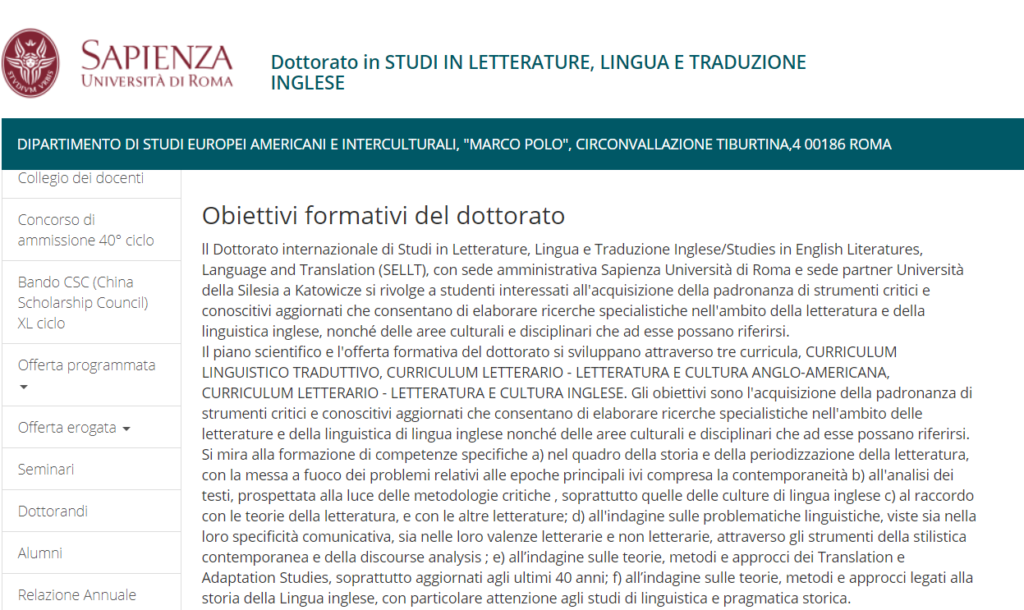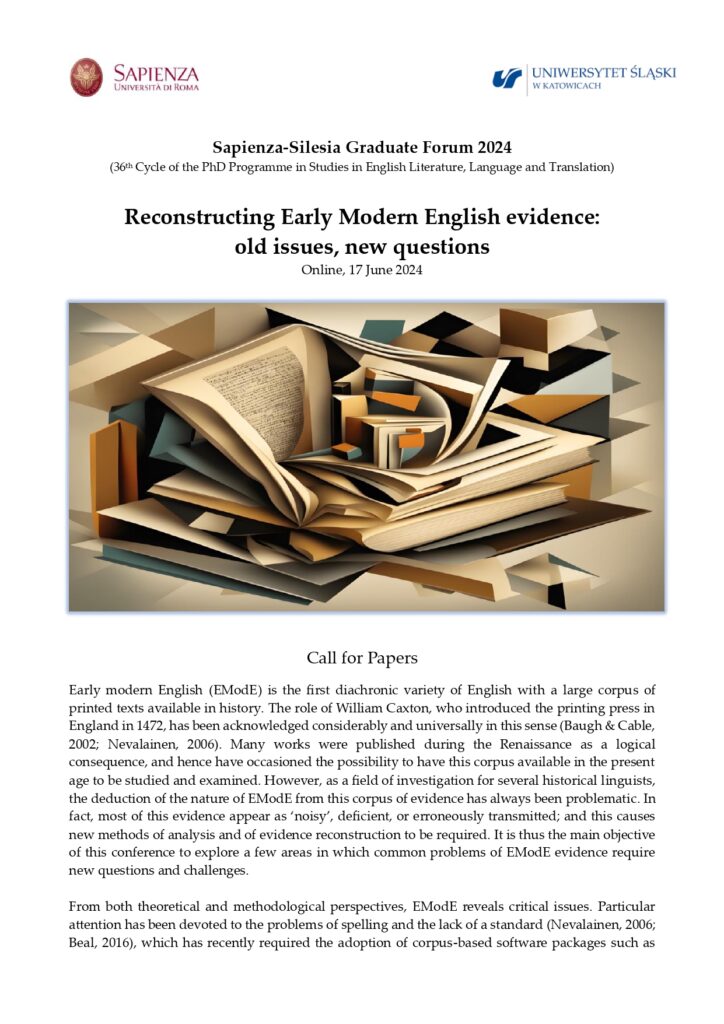CALL FOR PAPERS Reconstructing Early Modern English evidence: old issues, new questions (online, 17 june 2024) Early modern English (EModE) is the first diachronic variety of English with a large corpus of printed texts available in history. The role of William Caxton, who introduced the printing press in England in 1472, has been acknowledged considerably and universally in this sense (Baugh & Cable, 2002; Nevalainen, 2006). Many works were published during the Renaissance as a logical consequence, and hence have occasioned the possibility to have this corpus available in the present age to be studied and examined. However, as a field of investigation for several historical linguists, the deduction of the nature of EModE from this corpus of evidence has always been problematic. In fact, most of this evidence appear as ‘noisy’, deficient, or erroneously transmitted; and this causes new methods of analysis and of evidence reconstruction to be required. It is thus the main objective of this conference to explore a few areas in which common problems of EModE evidence require new questions and challenges. From both theoretical and methodological perspectives, EModE reveals critical issues. Particular attention has been devoted to the problems of spelling and the lack of a standard (Nevalainen, 2006; Beal, 2016), which has recently required the adoption of corpus-based software packages such as VARD2 (Baron, 2011) to normalise historical texts; this has improved significantly the investigation of this diachronic variety of English as well as the statistical manipulation of data retrieved from historical corpora of English respectively (Baron, Rayson & Archer, 2009). In this sense, the issue of data accuracy has been central in the application of corpus linguistics as a method to explore wide range of texts and as a discipline to be theoretically enhanced (Davies, 2015). Following this, the quantitative analysis of data has been implemented in the study of EModE and has consequently boosted the observation of trends in the diachronic development of the same variety (Jenset & McGillivray, 2017). These new methodological frontiers have contributed enormously to the review of past research and to the exploration of new fields of application, especially in specialized discourses (Gotti, 2005), e.g., the investigation of EModE medical discourse (Taavitsainen & Pahta, 2010). Another interesting area is the EMod phonology, which is no foreign country. It has been the subject of many studies, contemplating the Great Vowel Shift − pivotal for an understanding of the evolution of sounds in the period − but not limiting themselves to it (e.g. Barber, 1998; Gorlach, 1991; Nevailanen, 2006). Quite recently, some EMod sounds have even been utilised in theatrical experiments. In fact, Original Pronunciation (OP) − David Crystal’s reconstruction of the sounds ascribable to Shakespeare’s time and works − was adopted in productions such as “Romeo and Juliet” (2004) and “Troilus and Cressida” (2005) at Shakespeare’s Globe. Though still little investigated in relation to present-day performances (e.g. Crystal 2005), Crystal’s OP has the merit of having fostered research into the use of “usual speech” (Massai, 2020) and the accents of early modern performers (Venegas Meza, 2022). Yet the actual accentual dimension of Shakespeare’s is still in need of exploration. Against this backdrop, the first aim of this conference is to illustrate the state of the art of the critical issues in the study of EModE as a diachronic and diaphasic variety here presented, considering the question of how to exploit collected data in the production of evidence to provide a snapshot of EModE synchronically and to reconstruct its diachronic development between 1500 and 1700. Secondly, this conference will shed light on both natural, stage and foreign accents as put on by actors in the early modern period, and even to go beyond the latter by speculating – through, say, semi-phonetic spelling – on sounds and accents inferable from literary and scientific texts published between 1500 and 1700. Contributions from PhD candidates in the fields of early modern English are welcomed. Topics can include, but are not limited to: – corpus linguistics as a method to collect data in the study of early modern English. – quantitative analysis applied to the historical analysis of early modern English. – early modern English specialized discourses. – the problem of spelling and the importance of a standard in early modern English. – the segmental and suprasegmental dimensions, and the original pronunciation. – sociolinguistic practices in theatre. – pronunciation inferable from poems, diaries, letters, essays, treatises. Presentations will be delivered in English. Please send proposals/abstracts in English of no more than 250/300 words to the Organisers (reconstructingemee@gmail.com) by 30 April 2023. Proposals should be formatted as .doc or as .pdf and include the following information: title of the presentation, a brief outline of the topic, name of the speaker, professional affiliation, and email address. In addition, please include a short professional biography of no more than 100 words. Proposals will be evaluated by both the Organising and Scientific Committees and notifications of acceptance sent out by 16 May 2023. Accepted papers will be allocated a 30-minute slot, 20 minutes for presentation and 10 for discussion. Full presentations will not be required in advance of the event. The conference will be held online on 17 June 2024. Participation is free of charge. For further inquiries, please email the Organising Committee at reconstructingemee@gmail.com. Important dates • Submission Deadline: 30 April 2024 • Notification of Acceptance: 15 May 2024 • Conference Date: 17 June 2024 Organising Committee: Emiliana Russo and Remo Appolloni Scientific Committee: Faculty Board of the PhD Programme


